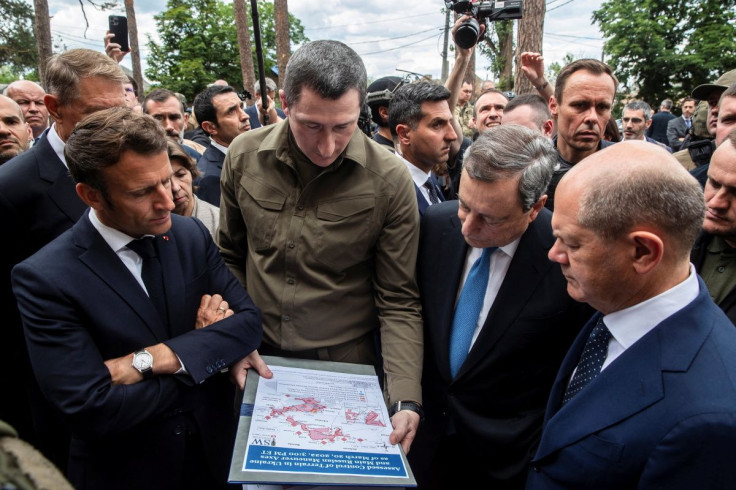Russians Close In On East Ukrainian Cities, Defenders Set To Quit Sievierodonetsk

Ukrainian troops were set to withdraw from the eastern city of Sievierodonetsk after weeks of intense bombardments and street fighting, the regional governor said on Friday, as Russian advances raised fears they could be cut off and surrounded.
Russian troops fully occupied a town south of Lysychansk, which lies across the Siverskyi Donets River from Sievierodonetsk, Ukrainian officials said. Moscow claimed it had encircled about 2,000 Ukrainian troops in the area.
The Russian advances appeared to bring the Kremlin closer to taking full control of Luhansk province, one of Moscow's stated war objectives, and set the stage for Lysychansk to become the main frontline city on that front.
Ukrainian forces had for weeks held out against an onslaught in Sievierodonetsk, trying to wear down Russian troops through attrition and buy time for the arrival of heavy weapons supplies from the West.
Luhansk governor Serhiy Gaidai said troops in Sievierodonetsk would have to be withdrawn and they had already received the order to move to new positions.
"Remaining in positions smashed to pieces over many months just for the sake of staying there does not make sense," Gaidai said on Ukrainian television.
Friday also marked four months since Russian President Vladimir Putin sent tens of thousands of troops over the border, unleashing a conflict that has killed thousands of combatants and civilians, uprooted millions people, and seen cities blasted to bits by Russian artillery and air strikes.
NOTHING LEFT TO DEFEND
Some of the heaviest fighting has taken place in Sievierodonetsk, where street-by-street combat has raged for a month with Russia painstakingly taking more ground.
"Our forces had to withdraw and conduct a tactical retreat because there was essentially nothing left there to defend. There was no city left there and, secondly, we could not allow them to be encircled," said Oleksander Musiyenko, a Kyiv-based military analyst.
Ukraine's Defence Ministry said the Russians were trying to surround Lysychansk and mounting assaults on Sievierodonetsk to win full control. But spokesperson Oleksandr Motuzyanyk declined to comment on Gaidai's remarks about a withdrawal.
About 10 km (6 miles) south of Lysychansk, Russian troops had entered the town of Hirske and fully occupied the district on Friday, municipal head Oleksiy Babchenko said.
"There is a red flag flying over the municipal administration (in Hirske)," a spokesperson for the regional administration told Reuters by telephone.
Russia's defence ministry said it had encircled up to 2,000 Ukrainian troops, including 80 foreign fighters, at Hirske.
Reuters could not independently verify the report and the Hirske spokesperson declined to comment on the assertion.
Ukraine's general staff said on Friday the Russians had fired from tanks, mortars and artillery and mounted air strikes near Lysychansk and Sievierodonetsk and nearby towns.
Reuters could not immediately verify the reports.
Ukraine's foreign minister played down the significance of the possible loss of more territory in the Donbas.
"Putin wanted to occupy the Donbas by May 9. We are on June 24 and still fighting. Retreating from a few battles does not mean losing the war at all," Dmytro Kuleba said in an interview with the Italian newspaper Corriere della Sera.
Analysts say the Russian forces are taking heavy casualties and face problems in leadership, supplies and morale. Nonetheless, they are grinding down Ukrainian resistance and making incremental gains in the east and south.
Russian control of the Donbas region though proxy separatists would allow it to link up with the already occupied Crimea to the south, which Moscow annexed from Ukraine in 2014.
DICTATORSHIP AND DEMOCRACY
Despite Ukraine's battlefield difficulties, it has won new support from the West. On Thursday, European leaders approved Ukraine's formal candidature to join the European Union.
Although the journey to full membership will take years, the move was a boost to Ukrainian morale.
Ukrainian President Volodymyr Zelenskiy told EU leaders in Brussels on Thursday their decision to accept Kyiv's candidacy was among the most important for Ukraine since it broke from the Soviet Union 31 years ago.
"But this decision is not just being made for the benefit of Ukraine," he said. "It is the biggest step towards strengthening Europe that could have been made right now...when the Russian war is testing our ability to preserve freedom and unity."
Moscow began what it calls its "special military operation" on Feb. 24, saying it wanted to ensure security on its borders. Kyiv and the West say Putin launched an unprovoked invasion to grab territory and bring Ukraine back into Moscow's fold.
Ukraine's Kuleba, talking to Corriere della Sera, sounded pessimistic about the prospects of any peace talks soon.
"Only our military victory will convince Russia to engage in serious peace negotiations. Weapons will secure the diplomatic route," Kuleba said.
Kyiv was still open to the idea of a Zelenskiy-Putin meeting in which "every point would be subject to dialogue," he said. But Ukraine was engaged in an existential struggle, he said.
"This is a war between dictatorship and democracy not chosen by us."
© Copyright Thomson Reuters 2024. All rights reserved.







